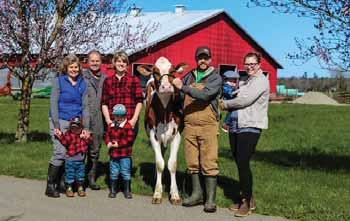
5 minute read
Farming for a Living
BY KATE GIRARD
When you look at farming in Cedar and area, it doesn’t take long to realize there are as many ways to farm as there are farmers. In fact, each farm is a world unto itself. Each has its own history, geography and lifestyle.
Take Ben Cuthbert’s dairy farm, for example. Cuthbert runs Silvermaple Holsteins on Adshead Road, along with his wife, Suzanne, and their son, Thomas, and wife, Catherine. Ben and Suzanne can chalk up fifty years as dairy farmers, each having grown up on a dairy farm on the Island. In 1988, they bought the place on Adshead, the former DeClark Dairy.
The original farm backs on to Cottonwood Golf Course and has grown from 160 to 355 acres. It’s picture perfect, with a long straight lane lined with plum trees, a welcoming white farmhouse and lush green fields. When I had arrived to meet him for an interview, Ben came out of the farmhouse to greet me, climbed into a pickup and told me, “Hop in.” We bounced along for a whirlwind tour of his world.
Cuthbert’s energy and his pride in the family farm shine through. When I asked him about the biggest challenge of farming, I was expecting an answer like the constant workload or perhaps worries about climate change. True, Suzanne and Ben work long hours, with two days off every two weeks, thanks to hired help. During the busy summer months, they’re lucky to get a day or two here and there. With the current drought, Ben checks the irrigation system frequently. “You can’t farm without water,” he told me. The animals need it, and so do the grass and corn he grows to feed them.
But the thing Ben Cuthbert likes least about farming? I would’ve never guessed. His answer came immediately: “Losing cows.” Of course, his answer makes perfect sense. Each one of his 300 cows is valuable, both as an animal under his care and as a producer of milk. Each is also likely to be part of a specific line of pedigree Holsteins, bred and developed at Silvermaple. From his office on Adshead, he’s connected to farmers around the world.
Our tour included a visit to the poultry barns, operated by their son Thomas. There, broiler chickens are raised year round. We ended with a walk through the barn on the home farm to see the two robotic systems used to milk the cows. This farm is complex, requiring a vast array of skills, but the Cuthbert world is an orderly one. Each family member has a unique set of responsibilities to keep the farm running smoothly. It’s clear Ben pays attention to all the details,

from a sprinkler head gone askew to his duties with provincial and national dairy organizations.
A few miles away but in a farm world of their own, the Hough family raises Aberdeen Angus cattle on the shores of Quennell Lake. Kilmarnock Farm has been in the family for over 150 years, ever since the fi rst land grants to the Bennie ancestors in 1872 and 1874. It’s a beautiful property, with extensive pastures and forests. Today, Rob Hough, his mother, Suzanne, and sister Marilee, and husband, Robert Grant, all live on the farm.
Rob Hough has farmed since he was 25 years old, beginning with sheep but then settling on Aberdeen Angus beef.
The herd ranges from 40 to 50 in size. It’s a cow-calf operation, raising calves until they’re about 500 to 600 pounds each, and then selling them to be finished at twice that weight.
Rob and Marilee radiate a relaxed good cheer when speaking of farm life. Rob’s favourite task is making hay. Though it’s hard work — especially since he leases 200 extra acres of hay land — he likes the sense of accomplishment in seeing the finished bales. His only complaint? Chasing cows when they break through fences. Marilee, retired from her career, does the books for the farm, has a large farm garden and helps out as needed.

Both Rob and Marilee expressed concerns about the future of farming in Cedar. They noted the growing population and the pressure for development. Like Cuthberts, they see the impact of the current drought. Rob mentioned another local beef farmer whose hay production dropped from a usual 2200 square bales to 480. However, Marilee and he agree the biggest deterrent to raising beef on the Island is the lack of a local abattoir.
Both Cuthberts and Houghs hope family members will continue to run their farms in the future — even though Rob observes the beef industry “seems to be all about numbers, industrial or corporate farming, rather than the family farm.” Each family takes great joy in the world of its farm and wants its way of life to continue.
No doubt about it, farming is hard work. But as Ben Cuthbert observed, “the future of agriculture gets better every time someone gets born and eats.” Cedar farmers will be there to feed them.






